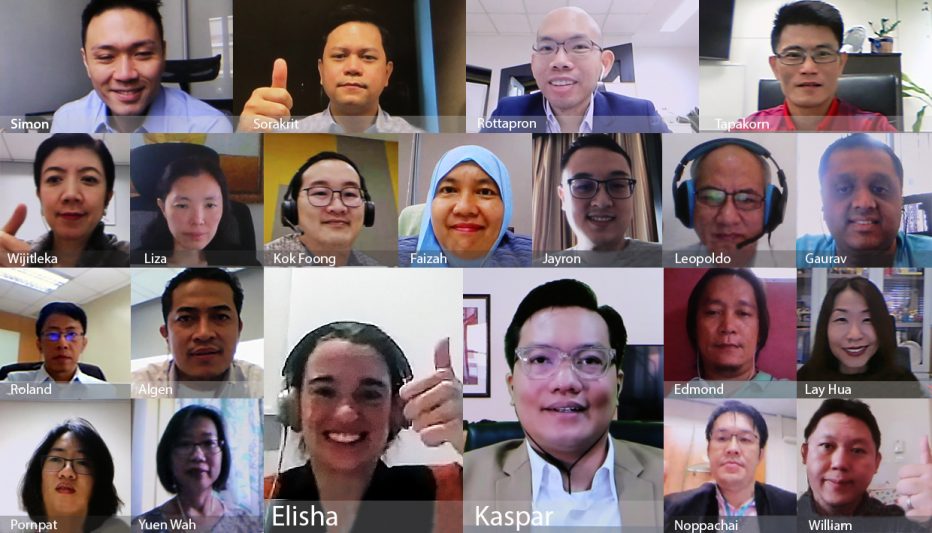
Adoption and convergence of cloud, virtualisation, cybersecurity technologies, etc. have caused a dramatic change in the financial services industry significantly impacting its functioning. Further, most organisations were already on their digital journey when the pandemic hit – forcing a seismic shift in urgency and scope of the transformation.
The OpenGovLive! Virtual Breakfast Insight on 22 September 2020 engaged delegates from the financial services industry across ASEAN to better understand the impact of digital disruption in this sector. The session witnessed overwhelming attendance and engagement from senior digital executives, keen on sharing and learning more about this timely and highly relevant topic.
The pressure to transform digitally should not out innovation on a back seat

The session was opened by Mohit Sagar, Group Managing Director and Editor-in-Chief, OpenGov Asia.
Mohit concurred that the financial sector industry was seriously hit during the pandemic and were, for the most part, reactive in their response.
Before COVID, organisations were working hard balancing different aspects of their business – regulations, stakeholders, customers, employees – in a F2F, physical context. With strict stay-at-home, remote working and quarantine measures in place, almost all fiscal and commercial transaction transitioned online. The need to go digital almost immediately, besides managing the regular aspects of business, has put the financial sector under immense pressure.
Under such pressure, Mohit cautioned delegates, organisations must not hold back on innovation. In fact, the industry should look at the pandemic as an opportunity to pivot – to ramp up digital transformation.
None the less, in this expedient endeavour, operational resilience must be maintained and security strategies must be reassessed. Existing protocols and processes must not only be maintained but need to be strongly augmented – adding new chapters as appropriate and necessary.
Mohit encouraged delegates to prioritise the well-being and happiness of employees as much as that of their customers. In urgent times like these, it is a well-trained, motivated and committed workforce that will help organisations stay afloat and thrive.
In closing, Mohit advised delegates to must partner with the right people who are experts in this field, it if they want to correctly balance the different aspects of their business efficiently and have a smooth transition into the digital world.
Empower and augment employees to achieve operational resilience

Elisha Harrington, Head of Financial Services Innovation, ServiceNow shared her insights with the delegates.
Elisha spoke about operational resilience as a driver of transformation and coordinated delivery of business outcomes. She echoed Mohit’s sentiments about financial institutions being under a lot of pressure as they were pivoting to paradigms that were unknown to them.
They had to deal with technological shortcomings, cybersecurity issues, connectivity gaps, compliance requirements, etc. along with adjusting to remote working. In such an environment, operating at scale necessitates that employees collaborate across teams and work with each other virtually.
Elisha opined that operational resilience comes down to an institution’s ability to absorb shock and set out risk tolerances for those parts of the business that are highly critical to its survival.
The strategy to survive she proposed, and indeed, thrive rests four main pillars: People, Technology, Facilities and Supplies. These pillars need to be in place and need to be consistently and continuously improved.
Additionally, technology and supplier resilience are critical in keeping organisations going. Elisha outlined three major components under this:
- Technology Supply Chain
- IT resilience and Outsource
- Cost of Resilience
Elisha concluded by highlighting the need to transform the risk and controls management across the organisations. To successfully transform, there needs to be integrated risk management which coupled with workflow optimisation will lead to better customer outcomes.
Digitisation is essential to serve customers effectively and efficiently

Kaspar Situmorang, Executive Vice President & Head, Digital Center for excellence at PT Bank Rakyat Indonesia spoke to the audience from a scale of operations perspective. For organisations serving a large number of customers more effectively and satisfactorily, Kasper felt, it is imperative to go digital.
To underscore his position, he then shared that his organisation’s digital transformation strategy that has two major focus points: First is digital business optimisation, that focuses on increasing efficiency and productivity by bringing in new business processes. The second is making the business digital, that includes creating new business models, generating new revenue streams and improving gross margins.
Kaspar stressed that good customer experience in both digitising and digital is their organisation’s top priority. To do that, they utilise AI as to both expand their customer base and better the customer experience.
He listed five critical competencies in which they invest heavily to grow: People with the right customer-centric mindset, Open Innovation Ecosystem, Data-driven organisation, Agile way of working and Scalable, reliable and secure technology
In conclusion, Kaspar shared the transformation framework of his organisation that comprises:
- Digitising core: Digitising their existing services. transactions and business processes
- Digital Ecosystem: Building an ecosystem to offer products and services beyond core business
- New Digital Propositions: Creating and launching an independent greenfield digital bank in Indonesia
He also shared various examples of the products and services under the above three categories to give delegates a better understanding of their work.
After Kaspar’s presentation, it was time for a more interactive and engaging session. The delegates were polled with a series of questions that was the foundation for discussion around the topic.
On the first question regarding major challenges faced by their organisation in operational resilience, a majority of delegates voted for lack of definition for ‘client business Services’ across organisations (30%).
A senior executive from Malaysia shared that it was imperative that the top management, (who grant the budget and the IT personnel in an organization), are aligned in one direction; if they are not aligned then there will be a lot of ambiguity around the business goals and objectives.
On the next question regarding the most important consideration for the future of their organisation, over half (52%) of delegates voted for data-driven decisions, i.e. using insights from big data and advanced analytics in workforce decision making.
A delegate from Singapore shared that he chose this option because he has observed that while there is a lot of data, it is not easy to assimilate and draw insights from it. So that is a journey they need to undertake.
On the final question about the need to do things differently in your organisation, the largest section voted for creating a better digital experience for customers (37%).
A delegate reflected that they chose the above option because it is a changing environment for the customers as well. Due to the pandemic, they want to go more and more digital. They want to avoid coming to the branch physically for things. So, the focus is on creating a better digital experience for customers.
After the polling session, Elisha addressed the audience with closing remarks. She thanked all delegates for their participation in the session.
Elisha concluded that if organisations have a good handle over their system, service health and necessary automation in place, they have the ability to start to innovate the core business services. This allows employees more time to add value to the core rather than spending time resolving simple/routine problems or getting lost in too many fragmented systems. This is the ultimate goal of service excellence.
She signed off by reminding delegates that ServiceNow solutions can assist and support them in attaining this goal and encouraged them to reach out to the ServiceNow team to explore ways they can collaborate.
















